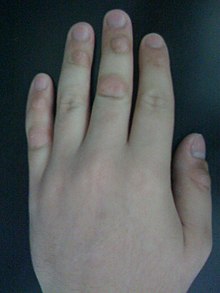
The inability to control the urge to pick is similar to trichotillomania.[2] Recent research suggests that, like trichotillomania, dermatillomania may be an impulse control disorder.
In some animal models, it has been shown that animals which excessively pull their hairs have more endorphin receptors in their brain than animals who do not. Endorphin receptors enable endorphins to have an effect on the brain. If this is true for humans, people who are particularly compulsive about their repetitive habits may have more endorphin receptors in their brain as well. This may explain why sufferers get more enjoyment out of picking their scabs than others.[citation needed]
Few mental health practitioners have studied the disease, as many of these cases go unreported, but some individuals have found relief through cognitive-behavioral therapy. Hypnosis, self-hypnosis and meditation have also been useful for some patients.[citation needed] They are also sometimes prescribed medications, such as those prescribed for obsessive compulsive disorder. For example, artificial fingernails (acrylic or gel) have been found to be useful to some in stopping the picking behavior.
Some causes of the onset of Chronic Skin Picking Disorder can be anxiety, stress, and it can even be a pacifier. For example, one may pick at their face while reading a book or watching television. There are several more treatment options for Dermatillomania. Rather than discussing the person’s problems, the therapist and the client take many steps to be rid of the habit. This method can be called ‘exposure therapy’. The therapist and the client can make a list of symptoms and situations in which the client starts picking at his/her skin. A task can then be assigned by the therapist that would put the client in an uncomfortable situation. In addition to this, there are many therapy and support groups available for adolescents and adults that have OCD.
No comments:
Post a Comment